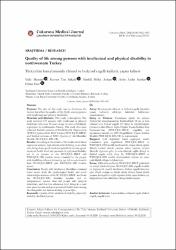| dc.contributor.author | Mercan, Yeliz | |
| dc.contributor.author | Selçuk, Keyser Tarı | |
| dc.contributor.author | Arıkan, Sunbul Hülya | |
| dc.contributor.author | Sayılan, Aylin Aydın | |
| dc.contributor.author | Eser, Erhan | |
| dc.date.accessioned | 2021-12-12T17:02:06Z | |
| dc.date.available | 2021-12-12T17:02:06Z | |
| dc.date.issued | 2020 | |
| dc.identifier.issn | 2602-3032 | |
| dc.identifier.issn | 2602-3040 | |
| dc.identifier.uri | https://doi.org/10.17826/cumj.735333 | |
| dc.identifier.uri | https://hdl.handle.net/20.500.11857/3381 | |
| dc.description.abstract | Purpose: The aim of this study was to determine the factors that affect the quality of life (QoL) among persons with intellectual and physical disabilities. Materials and Methods: This study is descriptive. The study involved 157 persons with intellectual or physical disabilities who were 18 years of age or over in Kirklareli, a province in northwestern Turkey. The study data were collected Turkish versions of World Health Organization (WHO) Quality of Life Brief Version (WHOQOL-BREF) and Turkish versions of WHO Quality of Life Disability Module (WHOQOL-DIS-TR). Results: According to the results of the multivariate linear regression analysis, high education level, living in an urban area, living alone, good-moderate perceived income, good moderate health level and presence of a physical disability led to an increase in the WHOQOL-BREF and WHOQOL-DIS module scores obtained by the people with disabilities whereas increasing age led to a decrease in their WHOQOL-BREF and WHOQOL-DIS module scores. Conclusion: People with intellectual disabilities obtained lower scores from the psychological health and social relationships domains of the WHOQOL-BREF, and from the WHOQOL-DIS disability module and its independence module than did people with physical disabilities, and that low education level, living in a rural area, poor income and poor perceived health were among the changeable risk factors leading to poor QoL. | en_US |
| dc.description.sponsorship | Turkey Ministry of Family and Social Policies' Support Program with Disabilities [2015-VLK39-001] | en_US |
| dc.description.sponsorship | This research was funded by Turkey Ministry of Family and Social Policies' Support Program with Disabilities (Grant number: 2015-VLK39-001). | en_US |
| dc.language.iso | eng | en_US |
| dc.publisher | Cukurova Univ, Fac Medicine | en_US |
| dc.relation.ispartof | Cukurova Medical Journal | en_US |
| dc.identifier.doi | 10.17826/cumj.735333 | |
| dc.rights | info:eu-repo/semantics/openAccess | en_US |
| dc.subject | Quality of life | en_US |
| dc.subject | intellectual disability | en_US |
| dc.subject | physically disabled | en_US |
| dc.subject | disabled persons | en_US |
| dc.title | Quality of life among persons with intellectual and physical disability in northwestern Turkey | en_US |
| dc.type | article | |
| dc.department | Fakülteler, Sağlık Bilimleri Fakültesi, Hemşirelik Bölümü | |
| dc.department | Fakülteler, Sağlık Bilimleri Fakültesi, Sağlık Yönetimi Bölümü | |
| dc.identifier.volume | 45 | en_US |
| dc.identifier.startpage | 1482 | en_US |
| dc.identifier.issue | 4 | en_US |
| dc.identifier.endpage | 1492 | en_US |
| dc.relation.publicationcategory | Makale - Uluslararası Hakemli Dergi - Kurum Öğretim Elemanı | en_US |
| dc.identifier.wos | WOS:000609003200027 | en_US |



















